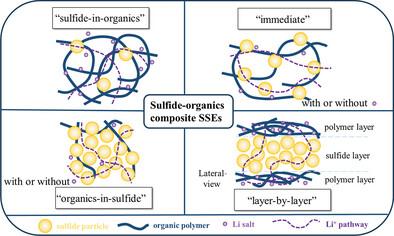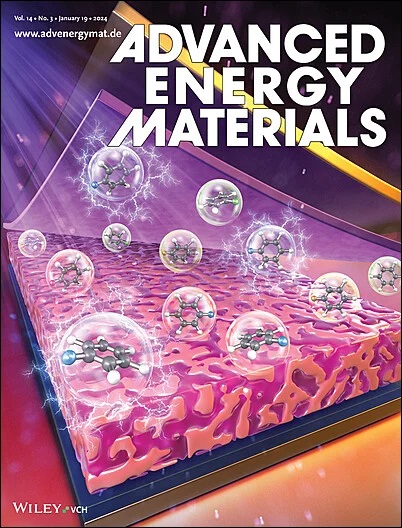Sulfide/Polymer Composite Solid-State Electrolytes for All-Solid-State Lithium Batteries
IF 24.4
1区 材料科学
Q1 CHEMISTRY, PHYSICAL
引用次数: 0
Abstract
This review introduces solid electrolytes based on sulfide/polymer composites which are used in all-solid-state lithium batteries, describing the use of polymers as plasticizer, the lithium-ion conductive channel, the preparation methods of solid-state electrolytes (SSEs), including dry methods and wet methods with their advantages and disadvantages. In addition, the physicochemical stability of sulfide/polymer composite based solid-state electrolytes is analyzed. The sulfide/polymer composite based solid-state electrolyte can be utilized in lithium metal or lithium sulfur batteries. However, there are still many problems left to be solved in practical applications of these solid-state electrolytes. In this review, several solutions are explored. Firstly, the ultra-long life cycle of batteries can be achieved by thinning the composite electrolyte. Secondly, when sulfur is applied as the positive electrode, the thinning electrolyte can reduce polarization and other problems. Finally, an integrated battery is employed to reduce the interface impedance. By addressing these aspects, the review aims to provide valuable insights into the future development of high-performance solid-state electrolytes in lithium battery technology.

用于全固态锂电池的硫化物/聚合物复合固态电解质
本综述介绍了全固态锂电池中使用的基于硫化物/聚合物复合材料的固态电解质,阐述了聚合物作为增塑剂的用途、锂离子导电通道、固态电解质(SSE)的制备方法,包括干法和湿法,以及它们的优缺点。此外,还分析了基于硫化物/聚合物复合材料的固态电解质的物理化学稳定性。基于硫化物/聚合物复合材料的固态电解质可用于锂金属电池或锂硫电池。然而,这些固态电解质在实际应用中仍有许多问题有待解决。本综述探讨了几种解决方案。首先,通过稀释复合电解质可以实现电池的超长寿命。其次,当使用硫作为正极时,减薄电解质可减少极化和其他问题。最后,采用集成电池可减少界面阻抗。通过探讨这些方面,本综述旨在为高性能固态电解质在锂电池技术中的未来发展提供有价值的见解。
本文章由计算机程序翻译,如有差异,请以英文原文为准。
求助全文
约1分钟内获得全文
求助全文
来源期刊

Advanced Energy Materials
CHEMISTRY, PHYSICAL-ENERGY & FUELS
CiteScore
41.90
自引率
4.00%
发文量
889
审稿时长
1.4 months
期刊介绍:
Established in 2011, Advanced Energy Materials is an international, interdisciplinary, English-language journal that focuses on materials used in energy harvesting, conversion, and storage. It is regarded as a top-quality journal alongside Advanced Materials, Advanced Functional Materials, and Small.
With a 2022 Impact Factor of 27.8, Advanced Energy Materials is considered a prime source for the best energy-related research. The journal covers a wide range of topics in energy-related research, including organic and inorganic photovoltaics, batteries and supercapacitors, fuel cells, hydrogen generation and storage, thermoelectrics, water splitting and photocatalysis, solar fuels and thermosolar power, magnetocalorics, and piezoelectronics.
The readership of Advanced Energy Materials includes materials scientists, chemists, physicists, and engineers in both academia and industry. The journal is indexed in various databases and collections, such as Advanced Technologies & Aerospace Database, FIZ Karlsruhe, INSPEC (IET), Science Citation Index Expanded, Technology Collection, and Web of Science, among others.
 求助内容:
求助内容: 应助结果提醒方式:
应助结果提醒方式:


